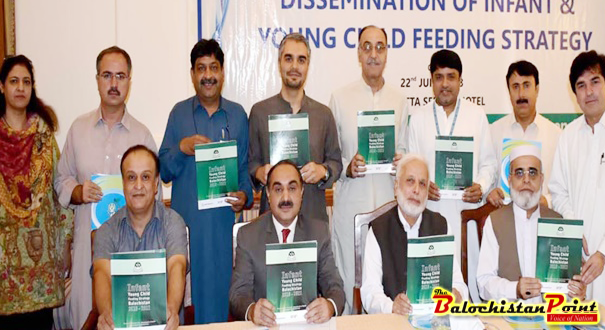By: Saeed Yousuf
QUETTA: Balochistan Nutrition Programme for Mothers and Children (BNPMC) Health Department Government of Balochistan with the support of UNICEF formally disseminated the IYCF (Infant Young Child Feeding) formally launched on 22 June 2018- 2022.
Addressing to the participants of ceremony Provincial Secretary Health Mr Saleh Mohammed Nasar said that launching of Infant young child feeding strategy is omen as it will pave the way across the province for better nutrition related activities. He stressed that all the resources will be utilised for the implementation of policy, adding that goal of the IYCF strategy is to improve the nutritional status, growth and development, survival of the infants and young children in Balochistan through optimal IYCF practices, during emergency and non-emergency situations.
“Malnutrition is a critical problem facing Pakistan but the severity portray a dismal picture in Balochistan and the role being played by the developing partners is very responsive commendable.” Secretary Health added.
Addressing to the ceremony Provincial Coordinator Balochistan Nutrition Program for Mothers and Children said that Malnutrition rates in Balochistan were alarmingly high. “Currently, more than half of all children under five are stunted – have low growth for their age – and 16 percent of the population is malnourished. Anaemia affects 70 percent of children and three quarters of pregnant and breast-feeding women,” he added.
He further said that Balochistan was in need of a comprehensive provincial IYCF strategy to help the provincial government and other relevant stakeholders for responding to issues and needs related to child malnutrition, keeping in view the provincial scenario. The strategy is to be in alignment with Pakistan IYCF Strategy, Communication Strategy and Infant Young Child Feeding in Emergencies Guidelines 2016.
Health Specialist UNICEF Dr. Amir Akram said that Provincial IYCF Strategy builds on past and continuing achievements in IYCF in the province. “It identifies the comprehensive supply and demand side actions that need to be taken to improve and maintain a conducive environment through effective legislation, policies standards for the protection of optimum IYCF practices, to strengthen the capacity of health services and communities to promote and support the nutritional needs of infants and young children.” he added.
Dr. Amir Akram said: “The role of the critical partners – government, UN agencies, international organizations, non-government organizations, community-based organizations and other concerned stakeholders– are also identified to ensure that collective action contributes to the full attainment of the Provincial IYCF Strategy.”
LMO Nutrition cell Dr. Rubina Mir, Health Specialist UNICEF Dr. Amir Akram highlighted main thematic areas of the strategy.
They added more about the specific objectives. They said: “This strategy includes increase in the percentage of newborns who are breastfed within one hour of birth from 63.4% to 75% (early initiation of breastfeeding) by 2022, increase the percentage of infants aged less than 6 months of age who are exclusively breastfed from 26.8% to 45% (exclusive breastfeeding) by 2022, increase the percentage of children aged 6-8 months who are breastfed and receive semi solid foods from 48.6% to 58.8% by 2022, increase the percentage of children aged 12-15 months who are still breastfed from 72.3% to 80.5%(Continued breastfeeding) by 2022.”
Adding more they said optimal feeding and care is essential for the prevention of poor nutrition and maximization of health, growth and development for infants and young children. Optimal feeding practices from age 0-2 years, known collectively as infant and young child[i] feeding (IYCF) practices, include:
– Early initiation of breastfeeding (within an hour from birth);
– Exclusive breastfeeding for the first 6 months of life;
– Age-appropriate, nutritionally adequate and safe complementary foods starting at 6 months;
– Continued breastfeeding for 24 months or beyond.
– Dietary diversity and adequate meal frequency among children under two years of age
Suboptimal IYCF practices especially low prevalence of exclusive breastfeeding, and in appropriate complementary feeding practices of infants and children are considered as the major factors contributing to the continuing problem of under-nutrition of children. The NNS 2011 showed that 27% of children had been exclusively breastfed, 63% had early initiation, 54 % had age appropriate breastfeeding and only 2.1 % children of 6-23 months of age had minimum acceptable dietary diversity in Balochistan. Appropriate IYCF practices from early childhood are of key importance for normal growth, as well as to prevent stunting in the long run.
Speaking on the occasion development partners FAO, WFP, WHO, Mercy Corps, appreciated the efforts been taken by Government of Balochistan and said that The 1000 days (constituting 9 months of pregnancy and the first two years of life) is a crucial period as the damages of malnutrition during this period have profound and largely irreversible effects on health, brain development, intelligence, educational attainment, and productivity.
They endorsed that the infant young child feeding practices have direct diversified impact in to the set United Nations agreed 17 Sustainable Development Goals . Development partners of Nutrition intervention have appreciated the efforts of Balochistan Nutrition Program for Mothers and Children and endorsed their full support in near future.
Published in The Balochistan Point on June 23, 2018
 Balochistan Point Voice of Nation
Balochistan Point Voice of Nation




